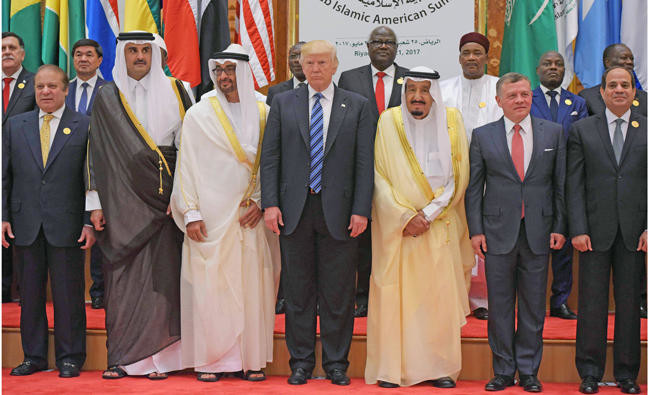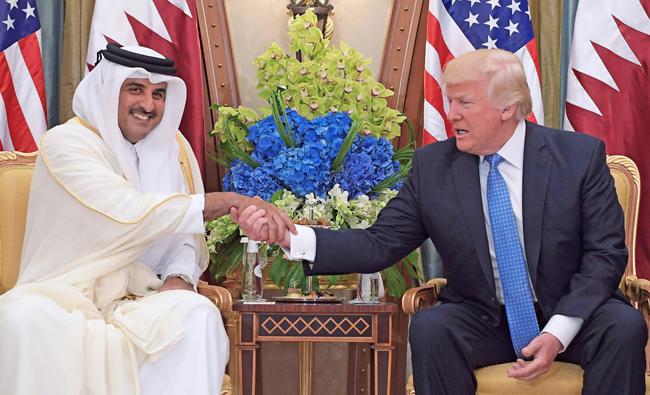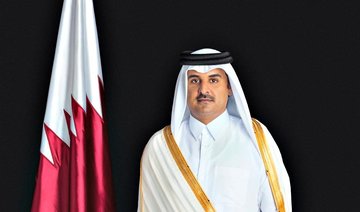JEDDAH: Tensions rose in the Gulf on Tuesday after a series of controversial comments attributed to Qatar’s emir, in a row that led to the blocking of Doha-aligned news websites in some neighboring states.
Sheikh Tamim bin Hamad Al-Thani’s alleged comments, carried by the official state news agency QNA, apparently saw him endorse Iran, Hamas and Hezbollah — strongly diverging from the stance of Qatar’s Gulf neighbors.
Doha claimed the report was the result of a hacking attack — but its Gulf neighbors responded nonetheless, particularly after the same comments were repeated in more than one language, on more than one outlet and at various times of the day in a manner which makes the story true and the hacking seem less likely.
The Arabic-language website and phone application of Al-Jazeera and the Middle East Eye website were blocked in Saudi Arabia and the UAE a day after the Qatari state news agency carried inflammatory comments attributed to Sheikh Tamim. Egypt also blocked some Qatari outlets, Al-Watan reported.
Earlier reports also attributed to the official Qatar News Agency said that Doha has withdrawn its ambassadors from Saudi Arabia, Egypt, Kuwait, Bahrain and the UAE, according to the Al Arabiya News Channel.
Qatar’s Foreign Minister said early Wednesday that he did not make any statement regarding the withdrawal or eviction of five Arab ambassadors from Doha, Al Arabiya reported.
Qatar maintains that the statement posted to QNA was the result of a hack, and says it is being investigated. But the report in question was simultaneously posted in different languages and on social media platforms, where they remained, according to Al Arabiya.
The remarks led to a widespread backlash on social media, while access to some Qatar-sponsored media outlets was restricted elsewhere in the Gulf.
The emir’s alleged comments were in line with recent criticism waged against the UAE, Bahrain and Saudi Arabia by other Qatar-sponsored media outlets such as Al-Jazeera, Al-Arab and the London-based Middle East Eye.
Sheikh Tamim also allegedly spoke of “tensions” with the new US administration and predicted that US President Donald Trump will not last long, citing domestic political problems in Washington over ties with Russia.
Sheikh Tamim also seems to have praised Iran, which even the previous US administration under President Obama labeled as the “biggest state sponsor of terror.”
The emir reportedly said: “There is no wisdom in harboring hostility toward Iran.”
Despite the emir allegedly saying that the relations with Israel are “good,” he went on to describe Hamas — which is designated as a terrorist organization by the US, EU and Israel and is condemned even by Arab countries for firing missiles toward civilians — as the “official representative of Palestinians.”
Despite this apparent endorsement of Hamas, the emir seems to have still refuted allegations of his country supporting terror. Yet many claim Doha supports both Lebanon’s Hezbollah and Egypt’s Muslim Brotherhood, which is designated a terrorist group by some fellow GCC countries.
The emir reportedly also criticized the UAE, Bahrain and Egypt for waging a campaign against Doha. All three countries are fierce critics of the Muslim Brotherhood. However, the emir seems to have not mentioned Saudi Arabia by name.
He did seem, however, to criticize what he described as “exaggerated” arms deals and said that countries should be spending such funds on development projects. That was an apparent attack on the recent enormous Saudi-US arms deals signed in Riyadh during President Trump’s visit.
The emir is said to have credited Al-Udeid Air Base, which houses the biggest US Air Force base in the region, with protecting Doha from some neighboring countries, without mentioning any names.
Whether the comments attributed to the emir are real or not, much of it reflects what was previously being reported by Qatari media outlets attacking Saudi Arabia, the UAE and Bahrain.
In a series of comments posted on his twitter account, Deputy Head of Dubai Police and General Security Dhahi Khalfan expressed his shock over the alleged statements.
In one tweet the Khalfan asked why Qatar would break the line of unity Riyadh has built, while in another he asked why Qatar would extend bridges with Iran.
Addressing Qatari citizens, Khalfan said: “You should not worry about Saudi Arabia, UAE, Bahrain, Kuwait and Egypt, you should be worried about Iran."
“Saudi Arabia succeeded in convincing the world of its stances but Qatar refused to listen,” the Dubai police chief added.
“What does Qatar mean that the US base is there to protect it from its neighbors? Qatari people are dear to their neighbors.”
Hack or attack? Qatari emir's allegedly contrarian 'comments' unsettle neighbors
Hack or attack? Qatari emir's allegedly contrarian 'comments' unsettle neighbors

Crown prince sponsors launch of world-class Arabic calligraphy center in Madinah

- The Prince Mohammed bin Salman Global Center for Arabic Calligraphy was inaugurated by Prince Salman bin Sultan bin Abdulaziz
RIYADH: A new center for Arabic calligraphy under the patronage of Crown Prince Mohammed bin Salman officially opened in Madinah on Monday.
The Prince Mohammed bin Salman Global Center for Arabic Calligraphy was inaugurated by Prince Salman bin Sultan bin Abdulaziz, governor of Madinah region.
He was joined by Culture Minister Prince Badr bin Abdullah bin Farhan, touring the new facility’s exhibition spaces and receiving briefings on cultural programming and the center’s achievements.
They also viewed collections highlighting Arabic calligraphy’s artistic and historical importance.
Speaking at the opening, Prince Badr said: “From this land of enlightenment and scholarship, we proudly launch a global platform dedicated to Arabic calligraphy as an invaluable cultural asset.”
He went on to credit the crown prince’s “generous and boundless support” for the cultural sector.
The minister said that the center demonstrated to the world the legacy of Arabic calligraphy while underscoring Saudi Arabia’s commitment to safeguarding its cultural identity and heritage.
According to Prince Badr, the facility represents an ambitious vision to elevate Arabic calligraphy as both a universal communication tool and an integral element of Arab heritage, art, architecture and design.
The center further aims to enhance the Kingdom’s cultural identity and strengthen its international presence, targeting calligraphers, emerging talents, visual artists, Islamic arts researchers, educational and cultural institutions, as well as art and heritage enthusiasts worldwide.
It will deliver specialized programs including research and archival services, calligraphy instruction, academic grants, a permanent museum, touring exhibitions, an international calligraphy association and a business incubator supporting calligraphy enterprises.
Additional offerings feature artist residency programs, expert-led workshops, and standardized curriculum development, complemented by international educational partnerships aimed at heritage conservation and expanding global appreciation for this time-honored art form.
The center’s establishment in Madinah carries particular significance, given the city’s historical role as the cradle of Arabic calligraphy and its association with transcribing the Qur’an and preserving Islamic knowledge.














